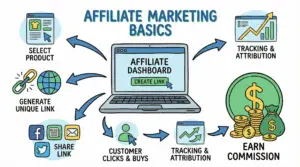Whether you want a side hustle or dream of going full time from your kitchen table, this guide is for you. I’m breaking down what you actually need to launch an online business from home, minus the confusing jargon or costly mistakes. By the end, you’ll have a solid game plan to get your idea off the ground and start seeing progress.
Step 1: Decide What Kind of Online Business You Want
Before you buy a website or start ordering samples, you have to know what type of business fits your skills and lifestyle. Not all online businesses work the same way; some require you to make or ship stuff, while others are 100% digital and can run on autopilot.
Popular Online Home Business Models
- Freelancing – Offer services like writing, design, or consulting
- Ecommerce – Sell physical or digital products, dropshipping, or print on demand
- Teaching & Coaching – Create online courses, do one on one sessions, or webinars
- Blogging/Content Creation – Run a blog, YouTube channel, or social media account and make money from ads, sponsors, or affiliate marketing
- Virtual Assistance – Help other businesses with admin, tech support, or customer service
Questions to Consider:
- What skills or hobbies could you turn into a business?
- How much time do you want to spend each week?
- Do you prefer building something hands on, or more passive income streams?
Knowing what excites you (and what you want to avoid) will help you pick a business you’ll want to stick with. Pick something you feel passionate about or a field where you wouldn’t mind learning new skills. This will help you stay motivated, especially on slow days. Take a bit of time to think on your strengths and weaknesses too—being honest here makes everything smoother later on.
Step 2: Validate Your Idea Before Investing Time or Money
It’s super important to check if there’s demand for what you want to offer. This step saves you from spending weeks or cash on an idea no one wants, and it’s easier than most people think.
Ways to Validate Your Online Business Idea:
- Search for your idea on Google. Are there others doing it successfully?
- Check popular forums and Facebook groups for people asking about this type of service or product
- Use keyword planners (like Google Keyword Planner) to see if people search for what you offer
- Ask friends or online communities if they’d buy or use your service
- Run a quick survey or poll to get feedback
- Use an AI tool like MillionSpark to validate your idea within minutes.
Pro Tip:
Don’t get discouraged if there’s competition. That usually means there’s a market! The trick is putting your own spin on things or serving a specific audience that’s not getting what they need. Look at reviews of similar businesses. What are customers wishing was different? You can use these insights to shape your offer and stand out.
Step 3: Pick a Business Name & Register What You Need
Choosing a name for your business is a fun step, but you don’t have to overthink it. Pick something simple, easy to remember, and ideally available as a website domain. You can check domains quickly on sites like NameGenuity, Namecheap or GoDaddy. If your dream name is taken, try adding a keyword or using a .co or .net domain.
Registration Basics:
- Check if your country or state requires you to register as a sole proprietor or get a business license. Local online business resources can smooth the way.
- Grab your domain name early, even if you’re not launching yet. It’s worth securing it.
- Consider setting up a separate email for business tasks. Gmail or Outlook works fine for most small businesses.
Getting these steps done early is smart, so you don’t have to scramble once people start hearing about your business. Keeping your legal and digital setup tidy now makes everything smoother later.
Step 4: Set Up Your Digital Home Base
Your digital presence matters way more than your business cards. This is how customers, clients, or fans will find you, learn about you, and decide if they want to work with you. For most people, a simple website or landing page is enough to start. If you’re on a budget, even a well-crafted social media profile can work at first, as long as it’s clear and up to date.
Easy Platforms to Start With:
- Wix or Squarespace for beginner friendly websites
- WordPress.com for more flexibility and plugins
- Wealthy Affiliate for an all-in-one business building platform
Getting Set Up:
- Add an “About” page with a personal intro and what you offer
- Include a way to contact you—either a basic form or just your email
- List your products, services, or free resources for people to check out
The goal is to make it easy for visitors to know exactly what you do, see your personality, and find how to get in touch. Don’t stress about a fancy logo or perfect text. Your online business homebase will grow and change as you get feedback—just make sure it’s simple and honest at the beginning!
Step 5: Tools & Tech to Run Your Home Business Smoothly
You don’t need fancy gadgets or expensive apps to run most online businesses. A few basics are all you need to hit the ground running (and avoid headaches later).
No-Fuss Essentials:
- Laptop or desktop that runs well, along with a good Wi-Fi connection
- Reliable backup solution like Google Drive, Dropbox, or an external hard drive
- Simple invoicing tool such as Wave or FreshBooks
- Communication tools (Zoom, Gmail, Slack, or whichever are easiest for you)
For selling products, you might put WooCommerce or Etsy to work. For services, tools like Calendly or PayPal for payments can make your workflow smooth. Don’t forget to keep things organized from the start—simple folder structures and calendar reminders go a long way. As you grow, you can add in more complex software but keep it light at first to avoid overwhelm.
Step 6: How to Find Your First Customers (Without Spending a Fortune)
Getting those first clients or sales is what most new business owners lose sleep over. It’s all about reaching out and building real connections, not just blasting ads everywhere.
Ideas That Work:
- Share your business story on your personal social media and ask friends to spread the word
- Reply to posts in Facebook or LinkedIn groups where people look for your service
- Join local online communities and offer a startup discount or bonus
- Answer questions publicly on sites such as Reddit, Quora, or relevant forums
- If you have a budget, try small ads on Facebook or Instagram (just $10 or $20 to start)
This is all about talking to real people, being helpful, and slowly building word of mouth. Don’t panic if it feels slow at first. Every business has humble beginnings, and sometimes your early customers turn into your biggest fans and best sources of feedback.
Common Beginner Questions & Bumps In The Road
What if I have no idea how to build a website?
Most website builders have drag and drop editors and free tutorials. You can also track down step by step guides on YouTube for anything that has you stumped. Don’t hesitate to ask in online business forums; people are often happy to point you in the right direction.
How long until I see real profit?
This really depends on your niche and effort. Some people make money in the first month, while others take a few months or more. Stick to your plan and keep learning from what works, and don’t get discouraged by slow starts. Persistence pays off.
I’m terrified of making mistakes. How do I get past this?
- Start small, and only spend what you’re comfortable losing at first
- Talk to people who have built similar businesses and listen to their advice
- Remember: everyone messes up at the beginning. Every mistake is a shortcut to getting better.
Mistakes are part of the process, so treat them as learning opportunities. Most successful online business owners can share plenty of stories about their earliest blunders and how those hiccups helped them grow.
Where to Go From Here: Next Moves
Your first online home business doesn’t have to be perfect, but getting started is what matters most. Begin with one small step, such as picking your business model or grabbing a domain, then tackle the next piece. In a few weeks, you’ll have something you’re proud to show off online.
Starter Checklist:
- Pick your online business type and brainstorm a simple name
- Check your idea with a little market research
- Set up your “home base” online (website or landing page)
- Tell 5 people what you’re launching and ask them to share
Got a business idea you’re eager to test? Drop your questions or ideas in the comments, and I’ll give you my honest feedback! Also, remember that your adventure has just begun. Stay flexible, keep learning, and most importantly, keep taking those tiny steps forward. Each day’s progress adds up, and before you know it, your homebased online business will be making waves.




